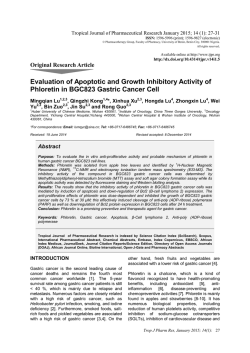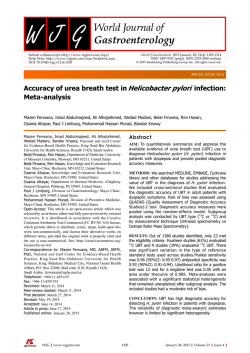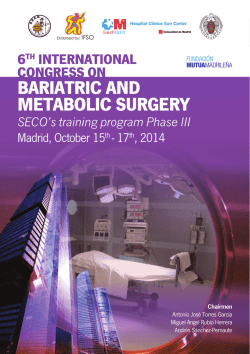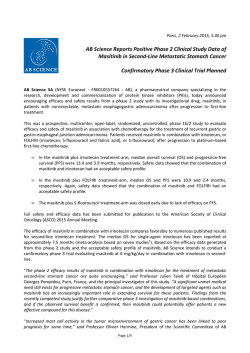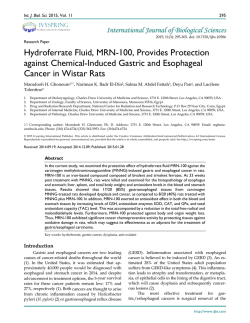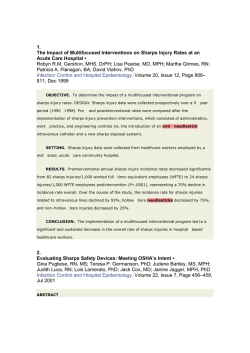
pdf - aisushi.es
Instituto de Investigaciones en Salud Preliminary Program: VI International Symposium Helicobacter pylori: natural history and implications for human health Wednesday, December 3, 2014 07:30-12:00 Registration 08:00-08:30 Opening 08:30-10:00 Inaugural Lectures (Chair: Guillermo Pérez-Pérez, Francis Mégraud) 1. Dr. Pelayo Correa: Helicobacter pylori and gastric pathologies overview. Division of Gastroenterology, Vanderbilt University Medical Center, USA. 2. Dr. Richard Peek: New insights into H. pylori-induced gastric cancer. Department of Medicine, Department of Cancer Biology, Vanderbilt University, USA. 10:00-10:45 Coffee break 10:45-11:30 Dr. Han-Kwang Yang. Gastric Cancer Treatment in Korea. Cancer Research Institute, Gastric Cancer Center, College of Medicine, Seoul National University, Korea. 11:30-13:30 Session 1: Epidemiology and Molecular Characterization (Chair: María Constanza Camargo, Vanessa Ramírez) 1. Dr. María Constanza Camargo. Gastric Cancer: Opportunities for Etiologic Research and Prevention. Division of Cancer Epidemiology and Genetics, National Cancer Institute, National Institutes of Health, USA. 2. Dr. Catterina Ferrecio. Preliminary results of a population-based study of HP and co-factors in two distinct areas of stomach cancer risk in Chile. Departamento de Salud Pública, Facultad de Medicina, Pontificia Universidad Católica de Chile, Chile. 3. Dr. Douglas Morgan. Division of Gastroenterology, Vanderbilt University, USA. Title to be announced 4. Dr. Charles Rabkin. Epidemiologic and molecular features of EBV-positive gastric cancer. Division of Cancer Epidemiology and Genetics, National Cancer Institute, National Institutes of Health, USA. 13:30-14:30 Lunch: posters rounds P01: Epidemiology and Molecular Characterization P02: Pathogenesis and Host Response 1 Instituto de Investigaciones en Salud 14:30-15:30 Session 1(continued): Epidemiology and Molecular Characterization (Chair: María Constanza Camargo, Vanessa Ramírez) 5. Dr. Karen Goodman. Community-driven research aimed at reducing health risks from H. pylori infection. Division of Gastroenterology, University of Alberta, Canada. 6. Dr. Michael Bruce. Helicobacter pylori infection in the Alaska Native population. Arctic Investigations Program, Center for Disease Control, USA. 15:30-16:30 Session 2: Pathogenesis and Host Response. (Chair: James Fox, Warner Alpízar) 1. Dr. James Fox. The influence of the intestinal flora on H. pylori gastric disease. Division of Comparative Medicine; Massachusetts Institute of Technology; Cambridge, USA. 2. Dr. Keith T. Wilson. Chemoprevention of gastric carcinogenesis by targeting ornithine decarboxylase in high risk populations. Vanderbilt University Medical Center, USA. 16:30-17:00 Coffee break: posters rounds P01: Epidemiology and Molecular Characterization P02: Pathogenesis and Host Response 17:00-18:30 Session 2 (continued): Pathogenesis and Host Response. (Chair: James Fox, Warner Alpízar) 3. Dr. Eliette Touati. Consequences of H. pylori infection on mitochondria and their genome. Unité de Pathogenèse de Helicobacter, Institut Pasteur, France. 4. Dr. Michael Naumann. Host response and molecular pathology in Helicobacter infected patients. Institute of Experimental Internal Medicine, Otto von Guericke University, Germany. 5. Dr. Céu Figueiredo. The stomach microbiota in gastric carcinogenesis. Institute of Molecular Pathology and Immunology, University of Porto, Portugal. 18:30-20:00 Parallel workshops 1-2 W01: Epidemiology and Molecular Characterization (Chair: María Constanza Camargo, Vanessa Ramírez) W02: Pathogenesis and Host Response (Chair: James Fox, Warner Alpízar) Thursday, December 4, 2014 2 Instituto de Investigaciones en Salud 08:00-10:30 Session 3: Diagnosis and Disease Markers (Chair: Javier Torres, Clas Une) 1. Dr. Luiz Gonzaga Vaz Coelho. Contribution of 13C-urea breath test to the knowledgement of H. pylori infection. Department of Internal Medicine, Faculty of Medicine, Universidad Federal de Minas Gerais, Brazil. 2. Dr. Guillermo Pérez-Pérez. Characterization of the stomach microbiota by highthrough-put sequencing and the role of Helicobacter pylori. Department of Medicine, New York University School of Medicine, USA. 3. Dr. Gunilla Høyer-Hansen. Prognostic, diagnostic and predictive value of intact and cleaved forms of the urokinase plasminogen activator receptor in cancer. Finsen Laboratory, Copenhagen University Hospital, Denmark. 4. Michael Ploug. Development of PET-tracer for the specific non-invasive imaging of the urokinase receptor in cancer. Finsen Laboratory, Copenhagen University Hospital, Denmark. 10:30-11:00 Coffee break 11:00-12:30 Parallel workshops 3-4 W03: Diagnosis and Disease Markers (Chair: Javier Torres, Clas Une) W04: Clinical Manifestations and Treatment (Francis Mégraud) 12:30-13:45 Lunch: posters rounds P03: Diagnosis and Disease Markers P04: Clinical Manifestations and Treatment 13:45-16:15 Session 4: Clinical Manifestations and Treatment (Chair: Francis Mégraud) 1. Dr. Francis Mégraud. Is there one optimal treatment for a Helicobacter pylori infection? Laboratoire de Bactériologie, Université de Bordeaux, France. 2. Dr. Tamara Matysiak. Diagnosis and management of gastric precancerous lesions. Service d'Hépato-Gastroentérologie, Hôpital Dieu, University of Nantes, France. 3. Dr. Javier Torres. Biomarkers for the early detection of patients at risk for gastric cancer in Latin American populations. Unidad de Investigación en Enfermedades Infecciosas, Instituto Mexicano del Seguro Social, México. 4. Dr. Leif Andersen. Rational diagnosis of Helicobacters. Department of Infection Control, Copenhagen University Hospital, Denmark. 5. Dr. Horacio Solano. Centro de Detección Temprana de Cáncer Gástrico, Hospital Max Peralta, Cartago, Costa Rica. Title to be announced 16:15-16:45 Coffee break: posters rounds P03: Diagnosis and Disease Markers 3 Instituto de Investigaciones en Salud P04: Clinical Manifestations and Treatment 16:45-19:00 Keynote lectures (Chair: Richard Peek, Guillermo Pérez-Pérez) 1. Dr. Martin Blaser. Complex biology of Helicobacter pylori and humans: the bad and the good. Department of Medicine, New York University School of Medicine, USA. 2. Dr. John Atherton. H. pylori strain determinants of gastric cancer risk…and are any strains entirely non-pathogenic? Nottingham Digestive Diseases Centre Biomedical Research Unit and Institute of Infection, Immunity and Inflammation Centre for Biomolecular Sciences, University of Nottingham, United Kingdom. 3. Dr. Jean Crabtree: Extra-gastric manifestations of childhood Helicobacter pylori infection in developing countries. Leeds Institute Molecular Medicine, St. James’s University Hospital, University of Leeds, United Kingdom. Friday, December 5, 2014 08:00-9:30 H. pylori and pathologies in Latin America (Chair: Pelayo Correa, Catterina Ferrecio, Beatriz Gutiérrez, Francis Mégraud) 1. Costa Rica: Dr. Vanessa Ramírez Mayorga. Cancer Epidemiology Program, Institute of Health Research, University of Costa Rica, Costa Rica. 2. Colombia: Dr. María Constanza Camargo. Gastric Cancer: Opportunities for Etiologic Research and Prevention. Division of Cancer Epidemiology and Genetics, National Cancer Institute, National Institutes of Health, USA. 3. México: Dr. Javier Torres. Unidad de Investigación en Enfermedades Infecciosas, Instituto Mexicano del Seguro Social, México. 4. Chile: Dr. Catterina Ferrecio. Preliminary results of a population-based study of H. pylori and co-factors in two distinct areas of stomach cancer risk in Chile. Departamento de Salud Pública, Facultad de Medicina, Pontificia Universidad Católica de Chile, Chile. 9:30-10:00 Coffee break 10:00-12:00 H. pylori and pathologies in Latin America (Chair: Pelayo Correa, Catterina Ferrecio, Beatriz Gutiérrez, Francis Mégraud) 5. Latin American: Luis Carvajal. Exome sequencing of gastric tumors from Latin American patients. Genome Center & Department of Biochemistry and Molecular Medicine, University of California, USA. 6. Cuba: Dr. Beatriz Gutiérrez. The Need of effective preventive & therapeutic vaccines in Latin America. Instituto de Oncología y Radiología, Cuba. 4 Instituto de Investigaciones en Salud 7. Venezuela: Dr. María Eugenia Cavazza. Nuevas fronteras en el diagnóstico serológico de la infección por Helicobacter pylori en Venezuela. Laboratorio de Microbiología Molecular, Instituto de Biomedicina, Ministerio del Poder Popular para la Salud, Universidad Central de Venezuela, Venezuela. 8. El Salvador: Dr. Douglas Morgan. Division of Gastroenterology, Vanderbilt University, USA. 9. Honduras: Dr. Douglas Morgan. Division of Gastroenterology, Vanderbilt University, USA. 10. Guatemala: Carmen Villagrán de Tercero. H. pylori infection and pathological diagnosis in Guatemala. Universidad de San Carlos, Guatemala. 11. Otros países: 12:00-13:00 Lunch 13:00-15:30: CagPAI genes mini-symposium (Chair: Martin Blaser, Steffen Backert) 1. Dr. Steffen Backert: Signal transduction of the Helicobacter pylori type IV secretion system and CagA effector protein. Department for Biology. Friedrich Alexander University Erlangen, Germany 2. Dr. Manuel Amieva. Department of Microbiology and Immunology, Stanford University School of Medicine, USA. Title to be announced 3. Dr. Jay V. Solnick. Functional plasticity in the type IV secretion system of Helicobacter pylori. Center for Comparative Medicine, University of California, USA. 4. Dr. Masanori Hatekayama. Role of Helicobacter pylori CagA oncoprotein in gastric carcinogenesis. Division of Microbiology, Graduate School of Medicine, University of Tokyo. 15:30-15:40 Presentation of the next meeting and closing remarks 5
© Copyright 2026
